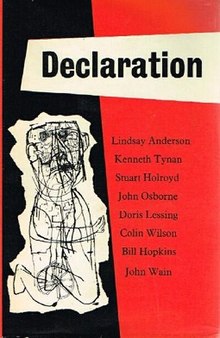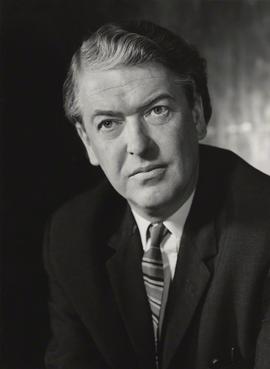
Sir Kingsley William Amis was an English novelist, poet, critic and teacher. He wrote more than 20 novels, six volumes of poetry, a memoir, short stories, radio and television scripts, and works of social and literary criticism. He is best known for satirical comedies such as Lucky Jim (1954), One Fat Englishman (1963), Ending Up (1974), Jake's Thing (1978) and The Old Devils (1986).
The Movement was a term coined in 1954 by J. D. Scott, literary editor of The Spectator, to describe a group of writers including Philip Larkin, Kingsley Amis, Donald Davie, D. J. Enright, John Wain, Elizabeth Jennings, Thom Gunn and Robert Conquest. The Movement was quintessentially English in character; poets from other parts of the United Kingdom were not involved.
The "angry young men" were a group of mostly working- and middle-class British playwrights and novelists who became prominent in the 1950s. The group's leading figures included John Osborne and Kingsley Amis; other popular figures included John Braine, Alan Sillitoe, and John Wain. The phrase was originally coined by the Royal Court Theatre's press officer in order to promote Osborne's 1956 play Look Back in Anger. It is thought to be derived from the autobiography of Leslie Paul, founder of the Woodcraft Folk, whose Angry Young Man was published in 1951.
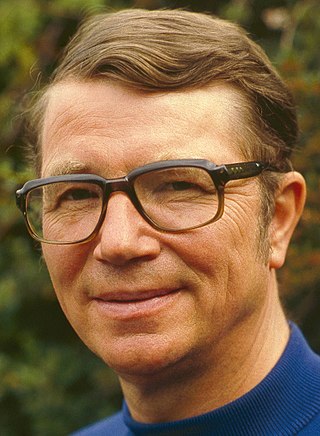
Colin Henry Wilson was an English writer and novelist. He also wrote widely on true crime, mysticism and the paranormal, eventually writing more than a hundred books. Wilson called his philosophy "new existentialism" or "phenomenological existentialism", and maintained his life work was "that of a philosopher, and (his) purpose to create a new and optimistic existentialism".

John James Osborne was an English playwright, screenwriter and actor known for writing prose that criticized established social and political norms. Look Back in Anger (1956) is his best known work. Osborne was one of the first writers to address Britain's purpose in the post-imperial age.
John Barrington Wain CBE was an English poet, novelist, and critic, associated with the literary group known as "The Movement". He worked for most of his life as a freelance journalist and author, writing and reviewing for newspapers and the radio.

Paul Bede Johnson was an English journalist, popular historian, speechwriter and author. Although associated with the political left in his early career, he became a popular conservative historian.

Jonathan Cape is a London publishing firm founded in 1921 by Herbert Jonathan Cape (1879–1960), who was head of the firm until his death.

Kenneth Peacock Tynan was an English theatre critic and writer. Making his initial impact as a critic at The Observer, he praised John Osborne's Look Back in Anger (1956), and encouraged the emerging wave of British theatrical talent. In 1963, Tynan was appointed as the new National Theatre Company's literary manager.
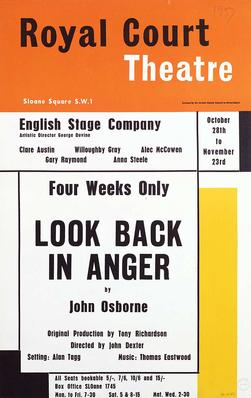
Look Back in Anger (1956) is a realist play written by John Osborne. It focuses on the life and marital struggles of an intelligent and educated but disaffected young man of working-class origin, Jimmy Porter, and his equally competent yet impassive upper-middle-class wife Alison. The supporting characters include Cliff Lewis, an amiable Welsh lodger who attempts to keep the peace; and Helena Charles, Alison's snobbish friend.
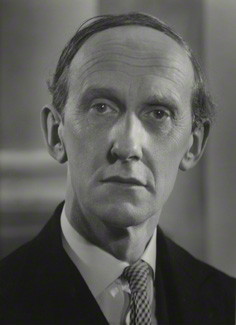
Lord Edward Christian David Gascoyne-Cecil, CH was a British biographer, historian, and scholar. He held the style of "Lord" by courtesy, as a younger son of a marquess.

Robert Kee was a British broadcaster, journalist, historian and writer, known for his historical works on World War II and Ireland.
Colin MacInnes was an English novelist and journalist.
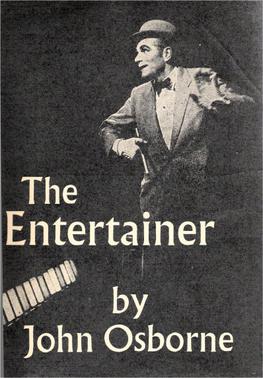
The Entertainer is a three-act play by John Osborne, first produced in 1957. His first play, Look Back in Anger, had attracted mixed notices but a great deal of publicity. Having depicted an "angry young man" in the earlier play, Osborne wrote at Laurence Olivier's request about an angry middle-aged man in The Entertainer. Its main character is Archie Rice, a failing music-hall performer. Years later, Tony Richardson, who directed The Entertainer's premiere season, described Archie as "the embodiment of a national mood ... Archie was the future, the decline, the sourness, the ashes of old glory, where Britain was heading". The first performance was given on 10 April 1957 at the Royal Court Theatre, London. This theatre was well-known for its commitment to new and non-traditional drama, and the inclusion of a West End star such as Olivier in the cast caused much interest.
Bill Hopkins was a Welsh novelist and journalist who has been grouped with the angry young men. His father was Ted Hopkins, a popular stage performer; his mother was Violet Brodrick.
Thomas Michael Maschler was a British publisher and writer. From 1960, he was influential as the head of publishing company Jonathan Cape over a period of more than three decades. Maschler was noted for instituting the Booker Prize for British, Irish and Commonwealth literature in 1969. He was involved in publishing the works of many notable authors, including Ernest Hemingway, Joseph Heller, Gabriel García Márquez, John Lennon, Ian McEwan, Bruce Chatwin and Salman Rushdie.
Stuart Holroyd is a British writer.
Len Doherty (1930–1983) was a British miner, journalist and writer. He has been named as "among the most important practitioners of the socialist novel in Britain."

The Divine and the Decay is a 1957 novel by the Welsh writer Bill Hopkins. It was republished as The Leap, in 1984. It tells the story of the leader of a British right-wing populist party who has decided to have his internal rival assassinated. To provide an alibi for himself he stays on a small Channel Island, where he becomes fascinated by a very self-possessed young woman. It was Hopkins' first and only published novel.

Emergence from Chaos is a 1957 book by the English writer Stuart Holroyd. In the first part of the book, Holroyd discusses different types of spirituality, while in the second part—roughly two thirds of the book—these distinctions are used to analyse the works of six different poets, each of whom reacted to the issues of modernity with his own spiritual vision. The book was Holroyd's debut and is associated with the phenomenon of the Angry Young Men.
